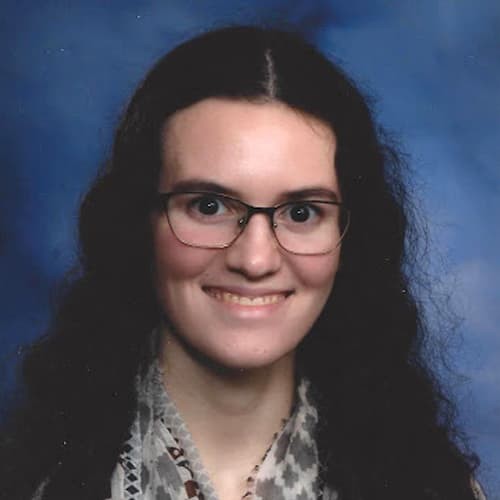Undergraduate Alumni Profile: Marisa Romanelli

Marisa Romanelli
Marisa Romanelli was an undergraduate student in the physics department at Boston College from 2016 to 2020. She worked in Prof. Ken Burch’s condensed matter physics group from 2017 to 2020, where she made transition metal dichalcogenide devices and automated Raman spectroscopy measurements. After graduating from BC, Marisa joined Prof. Vidya Madhavan’s group at the University of Illinois Urbana-Champaign. She is now a third-year graduate student studying magnetic and topological materials using scanning tunneling microscopy.
How do you reflect on your time as a physics undergraduate student at BC?
I wasn’t thinking about doing experimental condensed matter physics when I enrolled at BC; in fact, I don’t think 18-year-old me understood what that phrase meant. What I came into the physics department with was a burning desire to become a scientist and the intent to seize every opportunity available to me to pursue that dream.
The first opportunity presented itself earlier than I expected, when Prof. Burch gave a talk in my introductory physics class at the end of my first semester and ended the talk by saying that he was looking for new undergraduate researchers. I was surprised, as I didn’t expect there to be research opportunities available to freshmen, but I was intrigued by his talk on topological materials, which I hadn’t heard about before. I reached out to him after the talk and ended up spending the remaining three and a half years until I graduated working in his group. By the time I left, I knew what experimental condensed matter physics was – and that I wanted to get my PhD in it.
Now that I’m in graduate school at a large institution like UIUC, I really appreciate how BC’s smaller size was an asset to me, not only in terms of being able to start research early in my undergraduate career, but also in terms of the tight-knit cohort that formed among physics majors. Since there was only one section of every physics class, I saw the same people week after week, year after year; we may have started out as complete strangers, but by the time we graduated, we knew each other well.
How did your experience at BC contribute to your current career?
In addition to learning the specific techniques that I used in Prof. Burch’s group, such as photolithography and Raman spectroscopy, I also learned skills that are essential for any experimentalist. I worked on coding projects in a variety of programming languages and learned how to present my research through class projects and talks in group meetings. BC also provided me the opportunity to attend several conferences; I presented posters at CUWiP and at the Emerging Researchers National Conference.
When it came time to apply to graduate school, the physics department at BC was very helpful. Not only was I able to get advice from Prof. Burch and the other professors, but the graduate students in Prof. Burch’s group were able to guide me through the process based on their own recent experiences. The connections I made at BC also helped guide me towards Prof. Madhavan’s group specifically, as Prof. Zeljkovic at BC is a former postdoc of hers.
Right now, I’m still in the middle of my PhD program at UIUC. I’ve already been an author on one paper published by Prof. Madhavan’s group, and I am starting to write up the results of my current project. I don’t know exactly what the future holds, but I do know that wherever I end up, I’ll make use of the skills I learned at BC.

